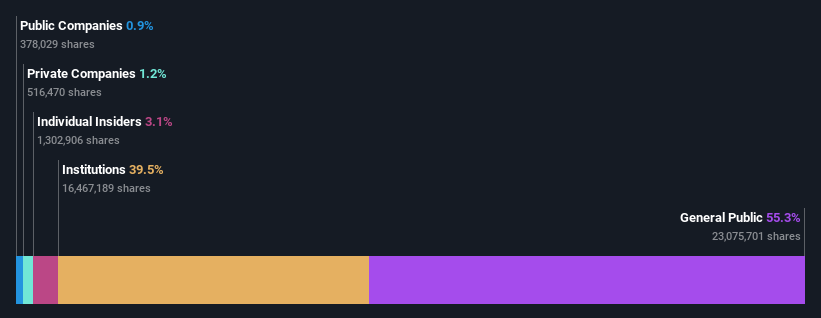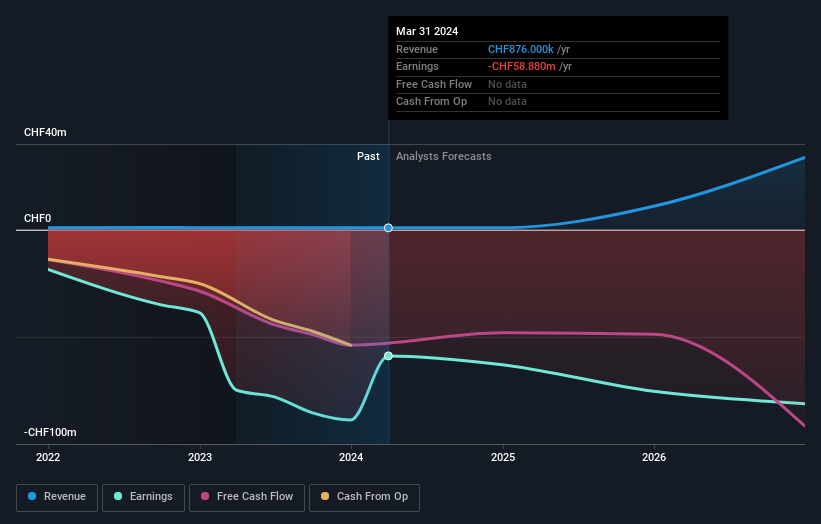While institutions own 39% of Oculis Holding AG (NASDAQ:OCS), individual investors are its largest shareholders with 55% ownership
Key Insights
Oculis Holding's significant individual investors ownership suggests that the key decisions are influenced by shareholders from the larger public
A total of 20 investors have a majority stake in the company with 45% ownership
To get a sense of who is truly in control of Oculis Holding AG (NASDAQ:OCS), it is important to understand the ownership structure of the business. The group holding the most number of shares in the company, around 55% to be precise, is individual investors. In other words, the group stands to gain the most (or lose the most) from their investment into the company.
And institutions on the other hand have a 39% ownership in the company. Large companies usually have institutions as shareholders, and we usually see insiders owning shares in smaller companies.
In the chart below, we zoom in on the different ownership groups of Oculis Holding.
See our latest analysis for Oculis Holding
What Does The Institutional Ownership Tell Us About Oculis Holding?
Many institutions measure their performance against an index that approximates the local market. So they usually pay more attention to companies that are included in major indices.
Oculis Holding already has institutions on the share registry. Indeed, they own a respectable stake in the company. This suggests some credibility amongst professional investors. But we can't rely on that fact alone since institutions make bad investments sometimes, just like everyone does. If multiple institutions change their view on a stock at the same time, you could see the share price drop fast. It's therefore worth looking at Oculis Holding's earnings history below. Of course, the future is what really matters.
We note that hedge funds don't have a meaningful investment in Oculis Holding. The company's largest shareholder is LSP Advisory B.V.,, with ownership of 18%. With 5.6% and 5.0% of the shares outstanding respectively, Landsbréf Hf. and BVCF Management Ltd are the second and third largest shareholders. Additionally, the company's CEO Riad Sherif directly holds 2.1% of the total shares outstanding.
Our studies suggest that the top 20 shareholders collectively control less than half of the company's shares, meaning that the company's shares are widely disseminated and there is no dominant shareholder.
Researching institutional ownership is a good way to gauge and filter a stock's expected performance. The same can be achieved by studying analyst sentiments. There are a reasonable number of analysts covering the stock, so it might be useful to find out their aggregate view on the future.
Insider Ownership Of Oculis Holding
While the precise definition of an insider can be subjective, almost everyone considers board members to be insiders. The company management answer to the board and the latter should represent the interests of shareholders. Notably, sometimes top-level managers are on the board themselves.
Insider ownership is positive when it signals leadership are thinking like the true owners of the company. However, high insider ownership can also give immense power to a small group within the company. This can be negative in some circumstances.
We can report that insiders do own shares in Oculis Holding AG. It has a market capitalization of just US$497m, and insiders have US$16m worth of shares, in their own names. Some would say this shows alignment of interests between shareholders and the board. But it might be worth checking if those insiders have been selling.
General Public Ownership
The general public, mostly comprising of individual investors, collectively holds 55% of Oculis Holding shares. With this amount of ownership, retail investors can collectively play a role in decisions that affect shareholder returns, such as dividend policies and the appointment of directors. They can also exercise the power to vote on acquisitions or mergers that may not improve profitability.
Next Steps:
It's always worth thinking about the different groups who own shares in a company. But to understand Oculis Holding better, we need to consider many other factors. For example, we've discovered 3 warning signs for Oculis Holding (1 is significant!) that you should be aware of before investing here.
Ultimately the future is most important. You can access this free report on analyst forecasts for the company.
NB: Figures in this article are calculated using data from the last twelve months, which refer to the 12-month period ending on the last date of the month the financial statement is dated. This may not be consistent with full year annual report figures.
Have feedback on this article? Concerned about the content? Get in touch with us directly. Alternatively, email editorial-team (at) simplywallst.com.
This article by Simply Wall St is general in nature. We provide commentary based on historical data and analyst forecasts only using an unbiased methodology and our articles are not intended to be financial advice. It does not constitute a recommendation to buy or sell any stock, and does not take account of your objectives, or your financial situation. We aim to bring you long-term focused analysis driven by fundamental data. Note that our analysis may not factor in the latest price-sensitive company announcements or qualitative material. Simply Wall St has no position in any stocks mentioned.

 Yahoo Finance
Yahoo Finance 

